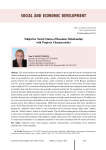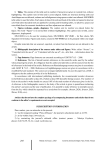Economic and Social Changes: Facts, Trends, Forecast @volnc-esc-en
Статьи журнала - Economic and Social Changes: Facts, Trends, Forecast
Все статьи: 1763

Subjective social status of Russians: Relationship with property characteristics
Статья научная
The article analyzes the relationship between subjective status and the level of consumption and volume of property in contemporary Russian society. It shows that key differences in income (the material basis of consumption), sets of durable goods, volume of property, and financial behavior are formed mainly between the subjective lower classes, which constitute a minority of the Russian population (14.5%), and the majority, which includes the subjective middle classes, as well as those who assess their status as high (85.5%). An analysis of the list of durable goods and various types of property made it possible to identify those that have become the generally accepted standard for the population, as well as those that have lost their differentiating power over the past two decades. Relatively new “markers” of subjective status include goods and property related to home comfort (e.g., air conditioners and dishwashers), mobility (foreign cars), and digital inclusion (computers and high-speed Internet access). The differences are even more pronounced depending on the novelty of certain types of consumer goods and property among owners from different status groups. Differences between status groups have been identified in terms of the financial behavior of their members: from wide-spread consumer loans for current needs among the “subjective lower classes” to the investment use of resources among “high-status” groups, while the “middle classes” adhere to a hybrid model. The low differentiating power of housing conditions in the context of subjective status was demonstrated, although ownership of a second apartment is more common among representatives of the subjective middle classes and in the “high-status” group and living in rented accommodation or in cramped conditions is more often associated with low status self-esteem.
Бесплатно




















